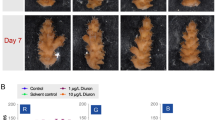Abstract.
The marine sponge Suberites domuncula was used as a bioindicator to study the effects of cadmium on the occurrence of DNA strand breakage and on the induction of the expression of the stress biomarkers, heat shock protein 70 (HSP70) and glucose-regulated protein 78 (GRP78) homolog. The cDNA encoding GRP78 homolog from S. domuncula was isolated and characterized. The GRP78 cDNA has a length of 2.1 kb and displays characteristic features of the HSP70 family; it encodes an aa sequence of Mr 72,000. Exposure of S. domuncula to 1 mg/L of cadmium chloride for 24 h caused a strong (16.6-fold) increase in cadmium content to 7.7 μg/g wet weight of sponge tissue; after an incubation period of 6 days, the accumulation was 20.4-fold. The increase in cadmium content was paralleled by a transient decrease in zinc content at days 1 and 3. Exposure of S. domuncula to cadmium chloride also resulted in a marked increase in the number of DNA single strand breaks, as assessed by a recently developed fast and sensitive microplate assay. The maximum increase in DNA damage was observed after an incubation of 12 h in the presence of 1 mg/L of cadmium chloride; after longer incubation, the number of damaged sites decreased, most likely due to DNA repair. Quantitative analysis of the expression of HSP70 (Mr 73 kDa) revealed that onset of maximal levels of HSP70 depends on the concentration of cadmium chloride in the ambient seawater. Maximal induction (8.9-fold increase compared to control) of HSP70 following exposure to 1 mg/L of cadmium chloride was found after 12 h, while longer incubation periods (3–6 days) were needed to reach maximum levels of HSP70 in the presence of lower concentrations of cadmium chloride (0.1 mg/L and 0.01 mg/L). Northern blot analysis revealed that the level of the 2.0 kb sponge GRP78 homolog mRNA transiently increased under cadmium stress; the maximum increase in the presence of 0.1 mg/L of cadmium chloride was observed at day 3. Our results suggest that sponges are useful indicator organisms to assess the genotoxic risks of cadmium pollution in marine environments.
Similar content being viewed by others
Author information
Authors and Affiliations
Additional information
Received: 13 March 1998/Accepted: 10 July 1998
Rights and permissions
About this article
Cite this article
Schröder, H., Hassanein, H., Lauenroth, S. et al. Induction of DNA Strand Breaks and Expression of HSP70 and GRP78 Homolog by Cadmium in the Marine Sponge Suberites domuncula . Arch. Environ. Contam. Toxicol. 36, 47–55 (1999). https://doi.org/10.1007/s002449900441
Issue Date:
DOI: https://doi.org/10.1007/s002449900441




